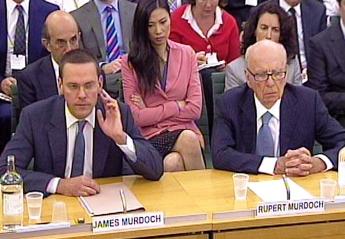That was the advice given to Bob Woodward by secret sourceDeep Throat regarding the journalist’s investigation into the Watergate scandal, a scandal that ended with the resignation of a president.

That was also the underlying scrutiny in a series of questions asked by a member of England’s Parliamentary committee looking into a scandal that, not unlike Watergate, began with one incident and may end with the resignation of media mogul and veteran newspaperman Rupert Murdoch.
As Murdoch and son, James, were undergoing the committee’s questioning, a protestor attempted to hit the elder Murdoch with a plate of shaving cream. After the police captured and escorted the man out of the room, James Murdoch was overhead asking police, “Why didn’t you see what was happening?”
It’s a notable piece of irony given the fact that the committee and much of the rest of the world has been looking for an answer to that same question from both Murdochs regarding the multiple phone-hacking incidents that led to the demise of one newspaper, The News of the World, and may, in fact reveal more wrongdoing from other Murdoch companies.
Watching the hearings, here are just a few of the remarks that stood out to me:
When asked if he ever considered resigning due to the scandal, Murdoch replied, “No… because I feel that people that I trusted let me down, I think that they behaved disgracefully. Frankly, I am the best person to clean this up.”
Regarding a question suggesting that The News of the Worldhad sought to obtain the phone numbers of 9/11 victims, the senior Murdoch said that he had “seen no evidence of these allegations.”
According to a full account of the meeting, The New York Times reported that “James Murdoch said he had ‘no knowledge, and there’s no evidence that I’m aware of,’ that [Rebekah] Brooks or other senior executives who have resigned from Murdoch companies as a result of the crisis had knowledge of phone hacking.”
Sound familiar?
It should. It’s The Enron Defense that Jeff Skilling and BP’s Tony Hayward used when answering questions before Congress:
SKILLING: Congressman, Enron Corporation was an enormous corporation. Could I have known everything going on everywhere in the company?
HAYWARD: We drill hundreds of wells a year around the world.
SKILLING: I don’t recall that…
HAYWARD: I don’t recall the time that was saved.
SKILLING: What I do not know, I do not know either because it was kept from me, or it never happened at all…
HAYWARD: I wasn’t part of the decision-making process…
When asked about the hundreds of thousands of dollars paid in both out-of-court settlements and lawyers’ fees, James Murdoch said the amounts – £60,000 up to £700,000 – were “below the approval thresholds that would have to go to my father as chairman and chief executive of the global companies.”
When committee member Philip Davies asked the elder Murdoch if he was ever given information about settlement payments in his regular conversations with newspaper editors, Murdoch said, no.
“What would you discuss with them?” Davies asked.
“I’d say, ‘What’s doing?’ [and] He might say, ‘We have a great story exposing X or Y,’ or he’d say, ‘Well, nothing special.’ ”
Of particular interest to me:
“I employ 53,000 people around the world who are proud, ethical, distinguished people,” Rupert Murdoch said.
“These actions do not live up to the standards that our company aspires to everywhere around the world,” James Murdoch said.
At one point, the younger Murdoch discussed the need for a thorough review of ethical standards in journalism, but nowhere in the extensive questioning does James Murdoch explain exactly what News Corporation’s ethical standards are or how they may have changed after a 2008 phone-hacking scandal.
Had I been on the panel, I would have asked both executives the following:
What were the ethical standards in place at The News of the World as well as News Corporation?
How were those standards changed or modified after the 2008 phone-hacking scandal?
What internal oversight measures were in place at the time of the most recent phone-hacking events?
Describe the ethics training that employees of your newspapers and News Corporation executives undergo
When asked, “Mr. Murdoch, do you accept that ultimately you are responsible for this whole fiasco?”
Murdoch answered, “No.”
“Who is responsible?”
“The people that I trusted to run, and then maybe the people that they trusted,” Murdoch said.
Or as Newt Gingrich so eloquently said, “You can’t trust anybody with power.”
Comments










